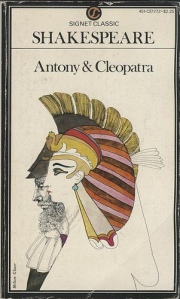 I had dim sum with my daughter, Hannah, yesterday and she took this opportunity to return some books she’d borrowed for writing an essay on Antony & Cleopatra. One of them was my Signet edition of the play, which I’ve had since I was 15 and which has huge sentimental value for me because it is one of the books that turned me into an avid reader.
I had dim sum with my daughter, Hannah, yesterday and she took this opportunity to return some books she’d borrowed for writing an essay on Antony & Cleopatra. One of them was my Signet edition of the play, which I’ve had since I was 15 and which has huge sentimental value for me because it is one of the books that turned me into an avid reader.
My family worried about me because rather than sit and watch TV with them I wanted to disappear into my room and spend time with dry texts by often disreputable authors. But they couldn’t disapprove of Shakespeare. My parents had even been to see Julius Caesar at the theatre. All right, maybe it’s a bit violent and supernatural but, after all, it’s historical and those Romans were a bloodthirsty, superstitious lot. Julius Caesar was the first Shakespeare play I loved and I read it many times before moving onto the others. I always read them in the little Signet editions and I still think they’re by far the best editions I own, although I’ve had to throw some away recently because they were damp and smelly from being too long in my garden shed.
I loved Anthony & Cleopatra probably more than any other because it was romantic and exotic. I was always attracted to foreign girls and Cleopatra was the ultimate foreign girl because there was so much uncertainty about her ethnic origin.
One of my favourite scenes was the banquet on Pompey’s galley at the end of Act II. Reading it, you might wonder why I liked it so much, but it’s because everything is left to your imagination. Shut away in my little bedroom far away from the din of my family, I was transported to a world of extravagant sensuality and otherworldy delights.
The idea of reading Antony & Cleopatra is odd because it wasn’t written as a book but as a play, to be seen. But I prefer reading it to seeing it. The fast-paced 42 scenes are notoriously difficult to stage. The play is so very different from the concentrated power of Phèdre, which Hannah has just seen at the National Theatre with Helen Mirren in the starring role. You need to pare back all the props and do something close to what Shakespeare’s own company would have done, which is to let the language suggest all the background pomp, the vast desert landscapes and magnificent costumes. I have seen it staged like this with plain white costumes and no scenery at The Globe, and it worked, but I still prefer the Cleopatra of my imagination.
You can learn a lot about how to excite someone’s imagination from this play. Its epic sweep is achieved with remarkably few words. The legendary love story is one in which the lovers rarely appear alone on stage together and the true nature of their relationship is as elusive as love itself. Cleopatra’s mythic charisma dominates even the scenes where she isn’t present and, when she does appear, the dialogue is brilliant, fizzing with playful, sexy, selfish passion. But even in the dialogue some of the deepest emotions are once again left to the imagination. The eloquence of the two simple words given to Charmian in Act V, scene 2 has often been cited as an example of Shakespeare’s genius. I once attended a whole lecture just on these two words. The lecture made a lasting impression on me and ever since, whenever I write dialogue, I try to apply what I learnt. Ah, but it’s difficult.
I don’t have the text of that lecture, but here is something close to what was said, which I found in a book called Making Theatre by Peter Mudford.
T.S. Eliot, writing about Shakespeare’s Antony And Cleopatra, showed his genius as a critic, as well as Shakespeare’s as a playwright, in pointing out what Shakespeare had added to his source in North’s Plutarch. In Act V, scene 2, Charmian, Cleopatra’s attendant, has watched the queen commit suicide by applying the asps to her arm and breast. She follows her queen into death, as the guards rush in.
FIRST GUARD:
What work is here! Charmian, is this well done?
CHARMIAN:
It is well done, and fitting for a princess
Descended of so many royal kings.
Ah! soldier.
Eliot pointed out that Shakespeare had added the last two words, ‘Ah, soldier,’ and commented, ‘I could not myself put into words the difference I feel between the passage if these two words, “Ah, soldier,” were omitted, and with them. But I know there is a difference and only Shakespeare could have made it.’ Christopher Ricks – the finest critic of poetry writing today – pointed out again what Eliot had perceived, adding ‘it is an act of genius in the critic to see that the act of genius in the artist was the cry “Ah Souldier”‘… Shakespeare has left to the actress, and the audience the responsibility for settling upon the right response to a phrase which gathers up all the previous action in a final comment on the quality of Antony’s love for Cleopatra. The resonance of the phrase illustrates the relationship between word, performance and audience as Shakespeare created it, and at the same time gave it freedom.
From Making Theatre by Peter Mudford